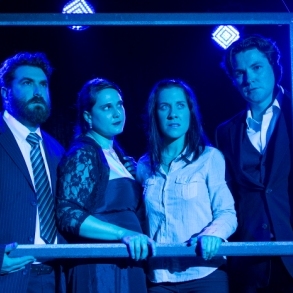
Lifestyle/Community

This post-modern horror story cuts to the quick
ROBYN SASSEN
Theatre: Bash, written by Neil LaBute, directed by Megan Willson, at Auto & General Theatre on the Square, Sandton (011) 883-8606
Until: September 27
Pictured: Daniel Janks; Jessica Friedan; Ashleigh Harvey and James Alexander in Bash.
PHOTOGRAPH SUPPLIED
This Neil LaBute play, was not awarded a Gold Ovation Award at the National Arts Festival in Grahamstown this year for nothing; it’s a flawless and riveting contemporary indictment on flaws in the moral fabric of our society.
It also celebrates collaboration. The name of the lighting professional does not appear in the programme, but the manner in which subtleties play over the two red plastic tub chairs on stage, show the mark of a sophisticated hand: never does the set, conjoined as it is with a filmic projection, become bland.
Further to that, are the performers. It’s an unusual play comprising three stories, two of which are premised on the values cast by Greek tragedies, each told directly to the audience, with astonishingly vivid and beautiful words rather than re-enactment.
Indeed, in A Gaggle of Saints, James Alexander and Jessica Friedan (who recently directed the marvellous Gogol production “Government Inspector” at Wits) don’t look at each other at all.
The effect of this device makes the work that much more intense, but also exposes the horror in each tale, clothed as it is in a contemporary garb with values we can access.
Each performer – Ashleigh Harvey and Daniel Janks play Medea Redux and Iphegenia in Orem respectively – shines like a gem in this immensely difficult but eminently successful piece.
In less capable hands, the work might judder into being text heavy or too intense: for a third of the work, the spotlight is on one performer who holds the responsibility of keeping his audience entranced and focused.
One emerges with one’s head spinning with the horror and beauty of Greek tragedy and moral chasms in contemporary values told with wisdom and poetry and hard-hitting indictments which are haunting.
As each vignette is developed and brought to its conclusion, taking the colloquial word “bash” and splaying it in several associative directions – as theatre practitioners like Lionel Newton and Sylvaine Strike recently did with “Greed” – your gaze at the performer becomes irrefutably coloured and three-dimensional with a sense of increasing horror.
In many respects, this foray into the central taboo tenets of Greek tragedy, from killing of one’s own children to breaking the bodies of those whose life-choices differ from your own, is a post-modern horror story: there’s no gore; it is all internalised into a fiercely elegant piece of theatre.
One emerges with a sense of universality and one of dread of the heaviness of moral culpability, but with the understanding of privilege in having seen something completely magnificent.




